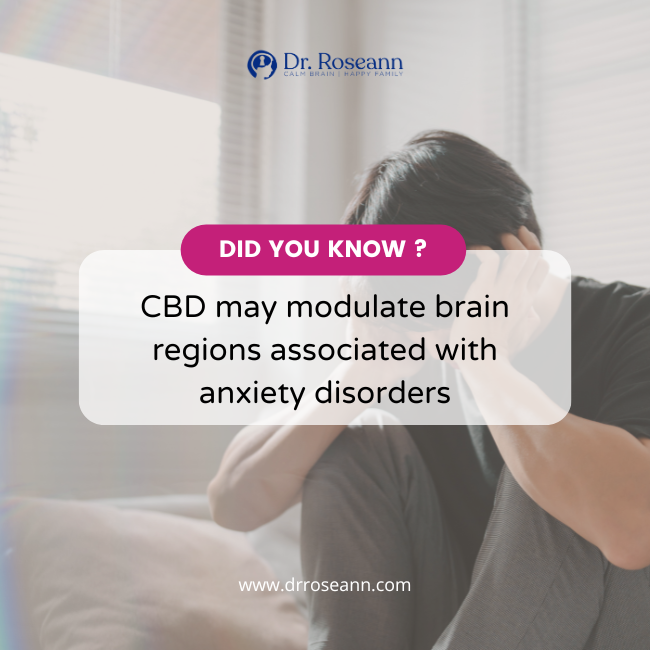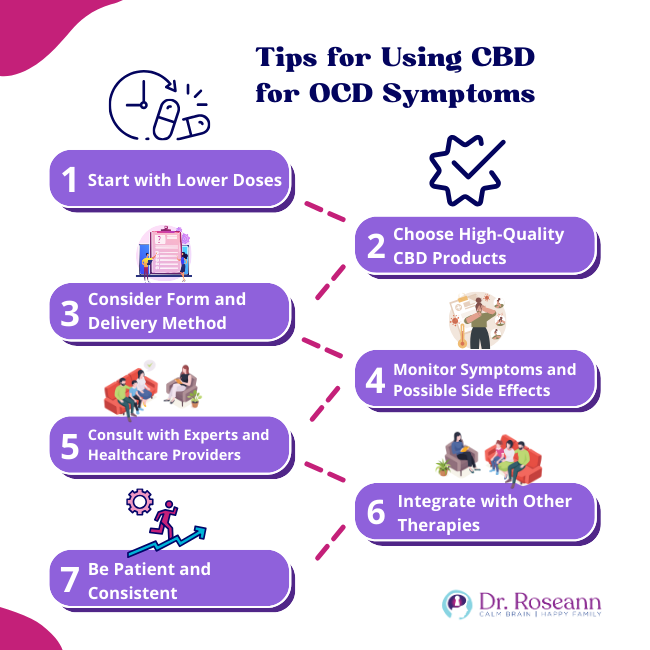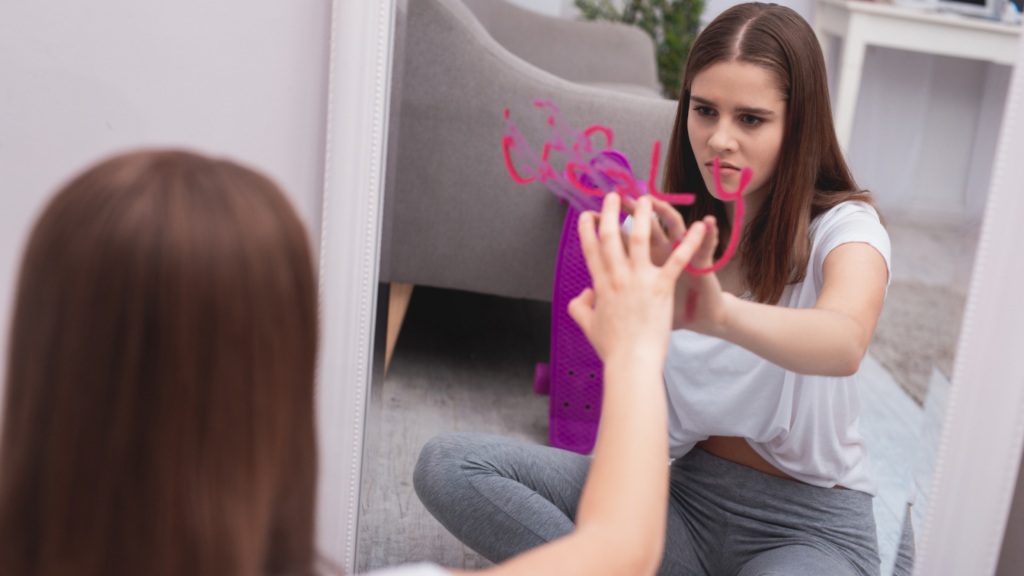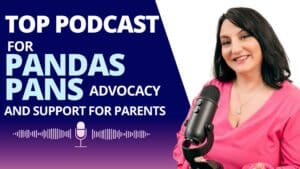Obsessive Compulsive Disorder (OCD) is a chronic condition characterized by obsessive thoughts and compulsive behaviors. While further research is needed to determine if medical cannabis can be used to address the symptoms of anxiety and OCD, it remains a potential treatment that warrants attention.
CBD, short for cannabidiol, is derived from hemp plants. It interacts with the body's endocannabinoid system, a complex network influencing various physiological processes. Unlike THC with psychoactive effects, CBD doesn't induce a “high,” which is why the possible use of CBD for anxiety and OCD is being widely considered.
Instead, it modulates cannabinoid receptors, potentially impacting brain regions associated with anxiety disorders and OCD symptoms. CBD also has been shown to lower inflammation, a common issue that I see with almost all of our clinic patients.
Let's explore the science behind this non-intoxicating compound and understand how it fits into the field of mental health conditions.
Research Studies on CBD for Anxiety and OCD
While the existing research on CBD, anxiety, and OCD is promising, it's important to note that the field is still evolving, and more comprehensive studies are needed. Here's a deeper look into the current state of research:
CBD and Anxiety
Numerous clinical trials and systematic reviews have explored the impact of CBD on anxiety-related symptoms. Studies, such as those conducted by Skelley et al. in 2020, indicate that

The compound seems to influence the intricate interplay of neurotransmitters and receptors, potentially leading to a calming effect.
The research suggests that CBD's anxiolytic (anxiety-reducing) properties may be attributed to its ability to interact with serotonin receptors in the brain. Serotonin is a neurotransmitter linked to mood regulation, and its dysregulation is often associated with anxiety disorders.
CBD and OCD
effective treatment Huffstetler et al. in 2023, have delved into CBD's effects on OCD. These studies showcase CBD's potential in addressing various symptoms such as intrusive thoughts and repetitive behaviors associated with OCD.
CBD's impact on the endocannabinoid system, a complex network influencing physiological processes, appears to play a role in modulating brain regions linked to OCD symptoms. The entourage effect, observed especially with full-spectrum CBD, further adds complexity to how CBD interacts with the body's systems (Ferber et al., 2020).
Important Considerations of Using CBD for OCD and Anxiety
Despite these positive findings, the journey isn't without complexities. Dosage considerations remain a crucial aspect. Individual factors such as body weight, the specific mental health condition being addressed, and desired outcomes play a role in determining the appropriate dosage.
Current research underscores the importance of a meticulous approach to CBD use. Striking a balance between effectiveness and avoiding potential side effects requires careful consideration, and the optimal dosage may vary from person to person. Taking higher doses of CBD for obsessive-compulsive disorder or any medical conditions can be detrimental.
Understanding the potential risks and side effects is crucial before starting. While many users experience positive effects, parents must be aware of possible adverse reactions, such as dry mouth, changes in appetite, and interactions with other prescription medication or therapy. Only the right amount of CBD can be an effective treatment for mental disorders.
Quality matters significantly in the realm of CBD as not all CBD products are created equal. The market is flooded with options, and discerning the quality of CBD products is of prime importance. Factors like the source of CBD, particularly the quality of the hemp plant, extraction methods, and third-party testing contribute to the overall grade of the product.
Tips for Using CBD for OCD Symptoms

Embarking on a journey with CBD to address OCD warrants not only enthusiasm but also practical know-how. Here are practical tips for those considering CBD as a potential ally in managing OCD symptoms, including social anxiety disorder.
Start with Lower Doses
When it comes to CBD, less is often more. Begin with low doses, never with high doses, and gradually titrate upwards. This approach allows for a better understanding of how your body responds to CBD and mitigates the risk of potential side effects. Finding the optimal dose is a personalized process, considering factors like body weight, the severity of OCD symptoms, and individual responsiveness.
Choose High-Quality CBD Products
Quality matters in the world of CBD. Opt for products sourced from reputable hemp plants and utilize reliable extraction methods. Third-party testing adds an extra layer of assurance and ensures that you receive a product that’s free from contaminants and has consistent CBD concentration. Making informed choices on product quality enhances the likelihood of a positive CBD experience.
Consider Form and Delivery Method
CBD comes in various forms, including oils, capsules, edibles, and topical creams. The choice of form depends on personal preferences and the specific nature of OCD symptoms. The sublingual CBD oil may be preferable for a more immediate impact, while capsules offer a convenient option for daily supplementation. The form and delivery method should align with your lifestyle and treatment goals.
Monitor Symptoms and Possible Side Effects
Ongoing observation is key to refining your CBD routine. Regularly monitor how CBD influences your OCD symptoms and overall well-being. Keep a journal documenting the dosage, form, and any observed symptom changes. This proactive approach enables you to make informed adjustments and optimizes the therapeutic potential of CBD for your unique needs.
Consult with Experts and Healthcare Providers
Communication with healthcare providers is important. Before incorporating CBD into your OCD management plan, consult with qualified healthcare professionals. They can provide valuable insights, and consider potential interactions with existing therapies or medications or even genetic variants. Ensure that CBD aligns with your overall treatment strategy. An informed and collaborative approach contributes to a comprehensive and well-rounded care plan.
Integrate with Other Therapies
CBD is not a one-size-fits-all solution. Consider integrating CBD into a holistic approach that may include Cognitive Behavioral Therapy (CBT), support groups, or other evidence-based treatment for OCD. A holistic approach or the use of multiple therapeutic modalities can enhance the overall effectiveness of your OCD management plan.
As we look at OCD success stories, we need to consider complementary therapies that work synergistically with proven therapies such as exposure and response prevention (ERP).
Be Patient and Consistent
Rome wasn't built in a day, and the same applies to CBD's potential impact on OCD symptoms. Be patient and consistent in your approach. Changes may take time, and the effects can vary from person to person.
Consistent use, coupled with ongoing self-monitoring, allows for a more accurate assessment of CBD's role in managing symptoms of OCD, such as intrusive thoughts and compulsive behavior. And these tools coupled with strategies and therapies can have an impact. When done right, it may improve one's quality of life.
Parent Action Steps
☐ Learn the basics of CBD, its nature, and how it works for OCD and anxiety symptoms.
☐ Recognize the importance of dosage in the use of CBD as an alternative treatment.
☐ Strive to find a balance between effectiveness and potential side effects.
☐ Integrate CBD into a holistic approach to reduce anxiety and OCD symptoms.
☐ Take the OCD Quiz to get solutions for your child.
☐ Work 1 on1 with Dr. Roseann through the BrainBehaviorResetTM Program.
Citations
Ferber, S. G., Namdar, D., Hen-Shoval, D., Eger, G., Koltai, H., Shoval, G., Shbiro, L., & Weller, A. (2020). The “Entourage Effect”: Terpenes Coupled with Cannabinoids for the Treatment of Mood Disorders and Anxiety Disorders. Current Neuropharmacology, 18(2), 87–96. https://doi.org/10.2174/1570159×17666190903103923
Huffstetler, C. M., Cochran, B., May, C. A., Maykut, N., Silver, C. R., Cedeno, C., Franck, E., Cox, A., & Fadool, D. A. (2023). Single Cannabidiol Administration Affects Anxiety-, Obsessive Compulsive-, Object Memory-, and Attention-like Behaviors in Mice in a Sex and Concentration Dependent Manner. Pharmacology Biochemistry and Behavior, 222, 173498. https://doi.org/10.1016/j.pbb.2022.173498
Skelley, J. W., Deas, C. M., Curren, Z., & Ennis, J. (2020). Use of cannabidiol in anxiety and anxiety-related disorders. Journal of the American Pharmacists Association, 60(1), 253–261. https://doi.org/10.1016/j.japh.2019.11.008
Are you looking for SOLUTIONS for your struggling child or teen?
Dr. Roseann and her team are all about science-backed solutions, so you are in the right place!
Grab your complimentary copy of
147 Therapist-Endorsed Self-Regulation Strategies for Children: A Practical Guide for Parents
You can get her books for parents and professionals, including: It’s Gonna Be OK™: Proven Ways to Improve Your Child’s Mental Health, Teletherapy Toolkit™ and Brain Under Attack: A Resource For Parents and Caregivers of Children With PANS, PANDAS, and Autoimmune Encephalopathy.
If you are a business or organization that needs proactive guidance to support employee mental health or an organization looking for a brand representative, check out Dr. Roseann’s professional speaking page to see how we can work together.
Dr. Roseann is a Children’s Mental Health Expert and Licensed Therapist who has been featured in/on hundreds of media outlets including The Mel Robbins Show, CBS, NBC, PIX11 NYC, Today, FORBES, CNN, The New York Times, The Washington Post, Business Insider, Women’s Day, Healthline, CNET, Parade Magazine and PARENTS. FORBES called her, “A thought leader in children’s mental health.”

She coined the terms, “Re-entry panic syndrome” and “eco-anxiety” and is a frequent contributor to media on mental health.
Dr. Roseann Capanna-Hodge has three decades of experience in working with children, teens and their families with attention-deficit hyperactivity disorder (ADHD), autism, concussion, dyslexia and learning disability, anxiety, Obsessive Compulsive Disorder (OCD), depression and mood disorder, Lyme Disease, and PANS/PANDAS using science-backed natural mental health solutions such as supplements, magnesium, nutrition, QEEG Brain maps, neurofeedback, PEMF, psychotherapy and other non-medication approaches.
She is the author of three bestselling books, It’s Gonna Be OK!: Proven Ways to Improve Your Child's Mental Health, The Teletherapy Toolkit, and Brain Under Attack. Dr. Roseann is known for offering a message of hope through science-endorsed methods that promote a calm brain.
Her trademarked BrainBehaviorResetⓇ Program and It’s Gonna be OK!Ⓡ Podcast has been a cornerstone for thousands of parents facing mental health, behavioral or neurodevelopmental challenges.
She is the founder and director of The Global Institute of Children’s Mental Health, Neurotastic™Brain Formulas and Dr. Roseann Capanna-Hodge, LLC. Dr. Roseann is a Board Certified Neurofeedback (BCN) Practitioner, a Board Member of the Northeast Region Biofeedback Society (NRBS), Certified Integrative Mental Health Professional (CIMHP) and an Amen Clinic Certified Brain Health Coach. She is also a member of The International Lyme Disease and Associated Disease Society (ILADS), The American Psychological Association (APA), Anxiety and Depression Association of America (ADAA) National Association of School Psychologists (NASP), International OCD Foundation (IOCDF).
© Roseann-Capanna-Hodge, LLC 2023










